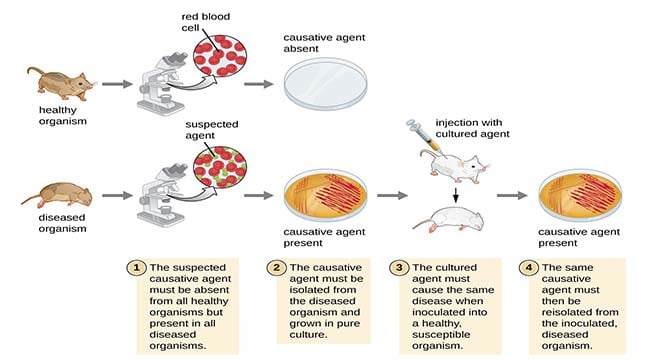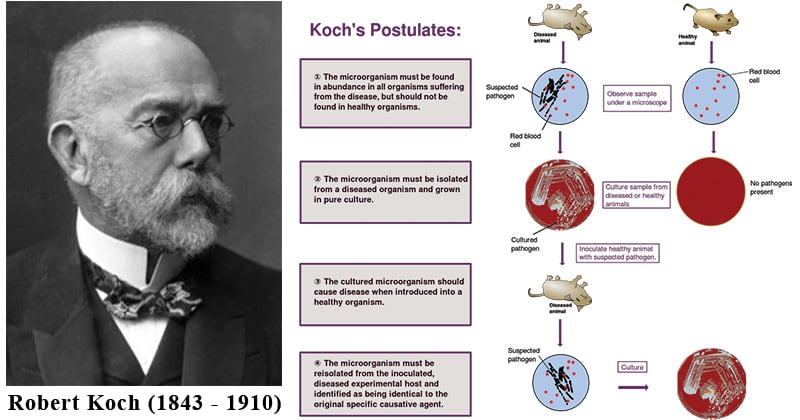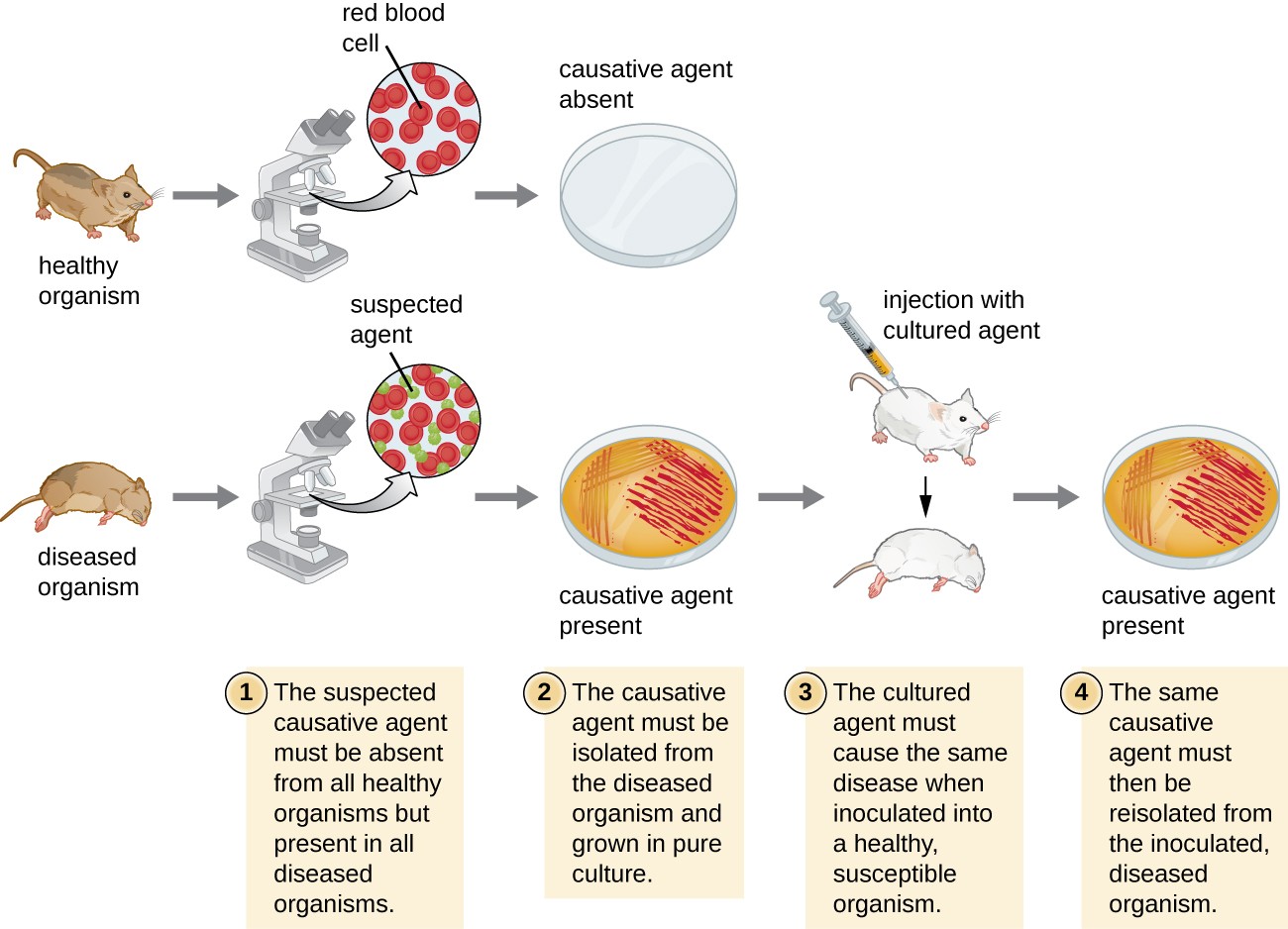Robert Koch's Postulates Are Used to Describe
Kochs postulate is a four step process that is used by scientist today. Robert Koch and Kochs Postulates In his experiment he isolated a pathogen from a disease infected animal.

Koch S Postulates And Its Limitations
Used to prove the causative relationship between most bacterial pathogens and their respective diseases Molecular version of Kochs postulate 1 the genefactor should be present in all pathogenic strains of the organism and absent from non pathogenic strains.

. Then he culture this pathogen in the laboratory. Even in Kochs time it was. Microbiologist Robert Koch Author of Kochs postulates a set of rules for establishing a relationship between a causative microbe and a disease.
Source for information on Kochs Postulates. In the late 1800s German physician Robert Koch formulated the series of steps required to prove the cause of any infectious disease. The postulates named after him require a series of observational and experimental.
Robert Koch developed four criteria to prove that a specific organism causes a disease. Koch is best known for his discovery of Mycobacterium tuberculosis the organism that causes tuberculosis. Kochs postulates are four criteria designed to establish a causative relationship between a microbe and a disease.
Kochs postulates were designed by Robert Koch to isolate and see if a specific organism is causing a disease or sickness. Heinrich Hermann Robert Koch English. The postulates were formulated by Robert Koch and Friedrich Loeffler in 1884 based on earlier concepts described by Jakob Henle and refined and published by Koch in 1890.
Isolation of the microbe by culture on lifeless media. The sample of the bacteria must be pure. Kochs postulates are named after the German physician Robert Koch 18431910 who was the first scientist to identify several important pathogens disease-causing agents.
The pathogen can be isolated from the diseased host and grown in pure culture. The causality of almost all infectious diseases is based on the postulate and theories developed by Robert Koch who is rightly called the father of pathogenic microbiology and his contemporaries. Up to 24 cash back Kochs Postulates.
Kochs postulates are four criteria designed in the 1880s to establish a causal relationship between a causative microbe and a disease. Robert Koch Demonstrates That a Particular Organism Causes a Particular DiseaseOverviewRobert Koch was the first scientist to firmly establish the link between germs and disease. Experiment of Kochs postulates.
The pathogen from the pure culture must cause the disease when inoculated into a healthy susceptible laboratory animal. Developed in the 19 th century Robert Kochs postulates are the four criteria designed to assess whether a microorganism causes a disease. Koch in Germany and Louis Pasteur in France were the 2 main founders of the science of bacteriology.
For this discovery Koch was awarded the Nobel Prize in. However it is important to understand that Kochs postulates are modified in the area of human health. The pathogenic microorganism must be present in all cases of the disease.
Robert Koch circa 1900. These postulates have guided scientists for over hundred years. 3 Inoculation of a healthy individual with the.
Four criteria that were established by Robert Koch to identify the causative agent of a particular disease these include. Robert Koch Demonstrates That a Particular Organism Causes a Particular Disease. Scientific concordance of microbiological pathological and clinical evidence.
Kochs postulates are a series of ground rules to. Koch applied the postulates to describe the etiology of cholera and tuberculosis but they have been. Kochs postulates are a set of principles that guide scientific efforts to establish the cause of an infectious disease.
Kochs criteria brought some much-needed scientific clarity to what was then a very confused field. 1 The microorganism must be found in diseased but not healthy individuals. Koch applied the postulates to describe the etiology of cholera and tuberculosis both of.
Kochs belief that only one pathogens causes one disease has now been called into question as multiple postulates are increasingly considered out of date. 2 The microorganism must be cultured from the diseased individual. After that he injects this pathogen culture into healthy mice.
Robert Koch conduct an experiment with a healthy mice to establish these four postulates. The bacteria must be present in every case of the disease. Kochs postulates refer to the four criteria established by Robert Koch to identify the causative agent for a particular disease.
Kochs postulates describe the steps he followed and establish the clear linkage between an organism and the disease it causes. Kochs postulates were developed in the 19 th century as general guidelines to identify pathogens that could be isolated with the techniques of the day. 11 December 1843 27 May 1910 was a German-American physician and microbiologistAs the discoverer of the specific causative agents of deadly infectious diseases including tuberculosis cholera though the bacterium itself was discovered by Filippo Pacini in 1854 and anthrax he is regarded as.
Science and Its Times. Kochs postulates are as follows. Today Kochs postulates are taught in high school and college classrooms as a demonstration of the rigor and legitimacy of clinical microbiology.
The bacteria must be isolated from. The first step is to isolate the virus for an infected person or animal. Robert Koch is also known as the Father of Clinical Microbiology Kochs postulate provided guidelines to identify the causative agent of an infectious disease.
As originally stated the four criteria are. A specific microorganism is always associated with a given disease and can be isolated from a diseased animal and cultured and the same microbe causes disease in healthy animals and can be isolated from newly infected animals. Kochs postulates ˈkːx are four criteria designed to establish a causative relationship between a microbe and a disease.
And reproduction of disease by inoculation of the cultured organism into a host. Scientific Method Linking Microbe with Disease Kochs Postulates. This is a photograph of Heinrich Hermann Robert Koch 18431910.
Was born in 1843. Robert Kochs postulates published in 1890 are a set of criteria that establish whether a particular organism is the cause of a particular disease. K ɒ x.
Developed in the late 19th century it has stood the test of time. Kochs postulate forms the very basis of the pathogenic microbiology. The pathogen must be reisolated from.
What are Kochs postulates. The critical elements of Kochs postulates include a specific association of the microbe with the disease state.


No comments for "Robert Koch's Postulates Are Used to Describe"
Post a Comment